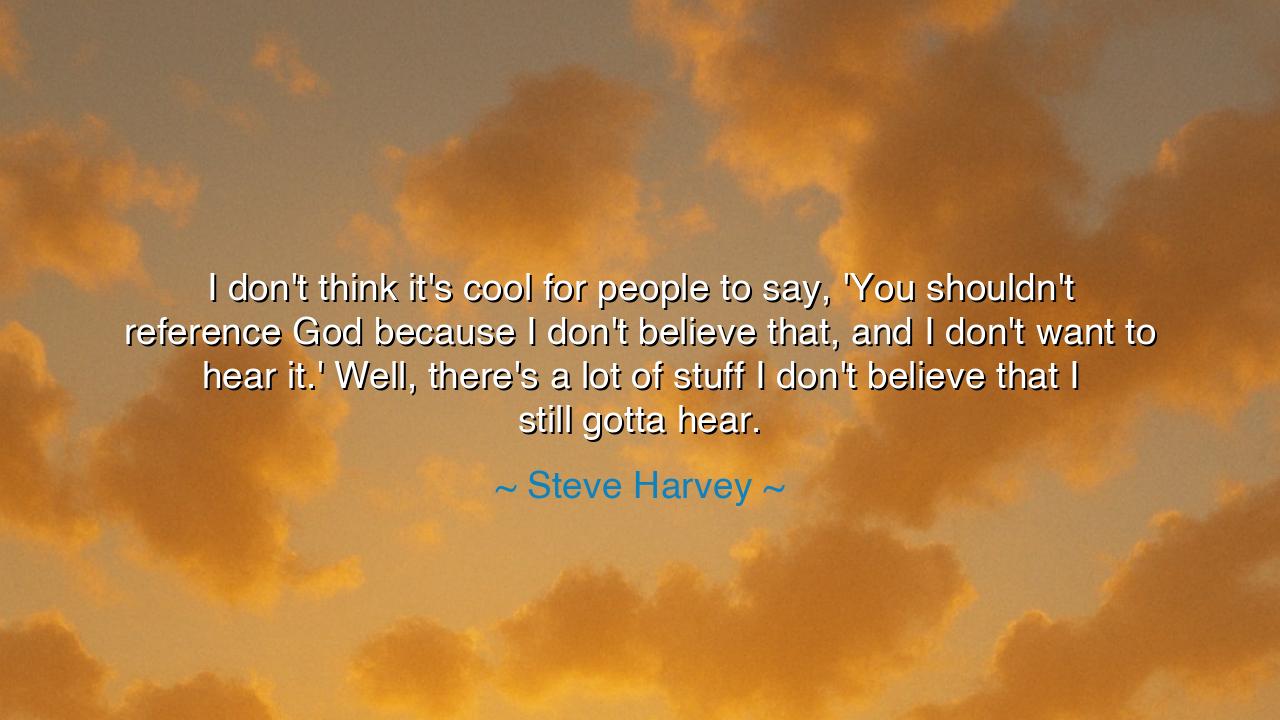
I don't think it's cool for people to say, 'You shouldn't
I don't think it's cool for people to say, 'You shouldn't reference God because I don't believe that, and I don't want to hear it.' Well, there's a lot of stuff I don't believe that I still gotta hear.






In the words of Steve Harvey, "I don't think it's cool for people to say, 'You shouldn't reference God because I don't believe that, and I don't want to hear it.' Well, there's a lot of stuff I don't believe that I still gotta hear." With this statement, Harvey speaks to a fundamental truth about the nature of freedom and respect in a diverse world. He reminds us that just as we must tolerate ideas and beliefs that we may not agree with, others, too, have the right to express their convictions, especially those that are deeply meaningful to them. In essence, it is an affirmation of the need for mutual respect and tolerance in a society that is rich with differing beliefs and opinions. It calls for a balance between freedom of expression and the recognition that everyone has the right to share what they hold dear.
This notion is not new, for it can be traced back to the ancient teachings of Socrates, who famously declared, "I am not an Athenian or a Greek, but a citizen of the world." Socrates did not limit himself to the confines of his own views, nor did he expect others to do so. He believed in the value of dialogue, in the importance of engaging with ideas—even those we might not agree with. For Socrates, the pursuit of truth and wisdom was found through questioning and listening to diverse perspectives. Harvey’s words echo this ancient wisdom, as he acknowledges the discomfort that comes with encountering ideas we don’t share, yet encourages us to embrace those challenges as part of the human condition.
Consider the life of Mahatma Gandhi, whose work was rooted in the principle of ahimsa, or non-violence. Gandhi faced vehement opposition to his ideas, both in India and abroad, yet he never silenced his belief in truth and spirituality. He famously said, "I claim to be a simple individual liable to err like any other fellow-mortal. I own that I am but a humble instrument of the Divine." Gandhi’s path was not one of forcing others to accept his beliefs, but of standing firm in them, while respecting the right of others to hold different views. Similarly, Harvey’s statement champions this spiritual autonomy, calling for an openness to differing beliefs, even as we hold to our own truths.
Throughout history, the great prophets—whether of religion or philosophy—have often faced rejection and criticism for their beliefs. Jesus of Nazareth was crucified, in part, because his message clashed with the dominant ideas of the time. Yet, he did not demand others to follow him; instead, he offered his message with humility and compassion, inviting all to consider the possibility of God's love. Martin Luther King Jr., too, faced immense opposition as he preached for justice, love, and equality, yet he never wavered in his belief that these principles were not just for some, but for all. Their lives show us that the expression of deeply held beliefs—whether religious or ethical—should not be silenced simply because others disagree. Just as Harvey asserts, our right to express our truth does not infringe upon another’s right to do the same.
Harvey’s words also tap into a core idea found in Stoicism, particularly in the teachings of Epictetus, who said, "We cannot choose our external circumstances, but we can always choose how we respond to them." The Stoics believed in the importance of cultivating an internal fortitude that allowed one to navigate the world’s differences without being shaken by them. When Harvey says, "there's a lot of stuff I don't believe that I still gotta hear," he is illustrating the Stoic idea that, while we may not agree with everything we hear, we have the power to choose how we respond. This is not an endorsement of blind acceptance, but an invitation to engage with ideas without hostility or dismissal.
The lesson here is clear: respect for others’ beliefs does not mean we must abandon our own. To live in a world of many voices, we must develop the wisdom to listen, even to the things we do not agree with, and to express our own convictions without fear of rejection. Harvey teaches us that disagreement is not a reason to silence others but an opportunity to practice patience, humility, and respect. The world is not made richer by the silencing of different voices, but by the open exchange of ideas, even those that challenge us.
Thus, let us take this lesson into our own lives. Let us not shy away from expressing what we hold to be true, whether it is a deep spiritual belief or a philosophical conviction, while also remaining open to hearing the truths of others. In a world that often values conformity over individuality, let us have the courage to stand by our beliefs, but also the wisdom to listen with an open heart. Let us practice tolerance and respect, for it is in the freedom to express and hear ideas that the seeds of growth and understanding are planted.






AAdministratorAdministrator
Welcome, honored guests. Please leave a comment, we will respond soon